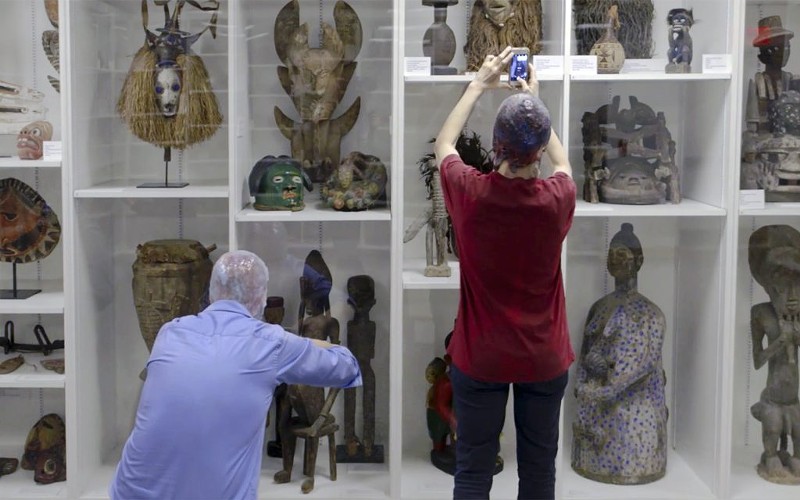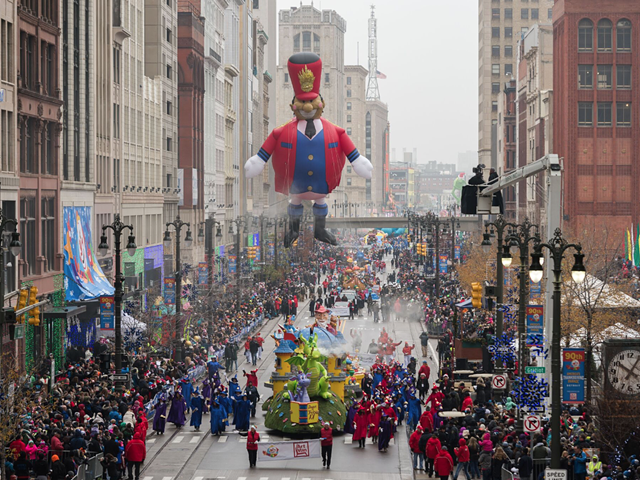
What we now call the United States occupies stolen land, and what we now call Detroit is known by the Anishinaabe as Waawiiyaataanong, or "where the water curves around (the land)."
Across the river, in Canada, the practice of "land acknowledgment" — or a formal statement honoring the original inhabitants of the country and their enduring presence after colonization — has gained popularity in recent years. In 2015, the country's Truth and Reconciliation Commission declared the government's past actions against Indigenous people to be a "cultural genocide," and Prime Minister Justin Trudeau campaigned on repairing the relationship, which he called "Canada's shame."
Today, schoolchildren say a brief land acknowledgment before reciting the national anthem that includes the traditional names for the area's land and tribes, and similar statements are announced before meetings of Parliament and even NHL hockey games. The practice is also common in Australia and New Zealand.
It hasn't caught on in the United States, but interest is growing. And artists working with the Museum of Contemporary Art Detroit could set an example for how to do it.
The push for a land acknowledgment at MOCAD was initiated by New Red Order, a "public secret society" dedicated to "Indigenous ends" facilitated by Indigenous artists, including brothers Zack and Adam Khalil, who are Ojibway and grew up in Sault Ste. Marie, and Jackson Polys, who is Tlingit from Alaska. The group has a lot of leverage here. It opened its first solo exhibition, Crimes Against Reality, at the gallery earlier this year. Developing a land acknowledgment for MOCAD, which includes a list of concrete actions the institution will take to dismantle the ongoing effects of settler colonialism and to serve Detroit's Indigenous communities, was "a precondition for its participation in the exhibition," New Red Order tells Metro Times, which was to be MOCAD's largest of the year so far. (Plus, in 2018 the group made headlines for facilitating what it describes as a "TEDTalk on acid about land acknowledgment" at New York's Whitney Museum of American Art.)
In July, after dozens of current and former MOCAD employees came forward with allegations of a toxic workplace, including instances of racism, New Red Order ordered the show postponed as a sign of solidarity. Finally, last month, after MOCAD had begun working toward addressing the issues, NRO agreed to resume the show.
Understandably, MOCAD seems to have a renewed interest in grappling with racism and improving its image, firing its previous executive director, making new appointments to its board, and rehiring Jova Lynne and Maceo Keeling, two of three Black curators who left during the past year. MOCAD's board credited the group for pushing it forward.
"MOCAD is thrilled that, together with the New Red Order, we continue to deliver on our mission of utilizing art as a vehicle to create discussion between diverse groups of people," board chair Elyse Foltyn said in a statement. "We hope that this Land Acknowledgment practice will be the first of many steps we take to recognize the history that brought us to Waawiiyaataanong and understand our role in repairing the legacy of settler colonialism."
With MOCAD now publicly committed to a land acknowledgment, now begins the hard work and figuring out what exactly that will look like. New Red Order says they don't want it to be just a simple boilerplate.
"If you're simply acknowledging that you're on occupied, stolen land, and then not doing anything about it, that's almost worse than not acknowledging it at all," Zack Khalil tells Metro Times.
In some cases, land acknowledgments are mandated by Canada's government, creating something of a paradox. "We say, over and over, that we want desperately to atone for a crime while we're still in the middle of committing it," The New Yorker's Stephen Marche wrote about the practice. And at their worst, he wrote, land acknowledgments can "sound like microwave warranties, not the desire for atonement." The absurdity is highlighted by a headline from Walking Eagle News, a satirical news site a la The Onion for Indigenous issues: "Executive utters touching territorial acknowledgment before flipping switch on new fracking operation."
"Commitment can be performative," Polys says. "To say that you're committed doesn't necessarily mean you're doing anything. So that's why with MOCAD, we went with this next step of like, OK, we want to have a commitment, and then we want the concrete actions listed and there to be an actual process behind that."
In Michigan, there aren't many examples of the practice at larger institutions. Some land acknowledgments exist at colleges like the University of Michigan and Michigan State University, but they're not implemented institutionwide. MSU's American Indian and Indigenous Studies program lists the following on its website:
We collectively acknowledge that Michigan State University occupies the ancestral, traditional, and contemporary Lands of the Anishinaabeg – Three Fires Confederacy of Ojibwe, Odawa, and Potawatomi peoples. In particular, the University resides on Land ceded in the 1819 Treaty of Saginaw. We recognize, support, and advocate for the sovereignty of Michigan's twelve federally-recognized Indian nations, for historic Indigenous communities in Michigan, for Indigenous individuals and communities who live here now, and for those who were forcibly removed from their Homelands. By offering this Land Acknowledgement, we affirm Indigenous sovereignty and will work to hold Michigan State University more accountable to the needs of American Indian and Indigenous peoples.
New Red Order says it didn't want to be the sole driving force behind the process at MOCAD. To that end, it has been assisting in the creation of the Waawiiyaataanong Arts Council to receive input from Detroit's Indigenous communities and to guide MOCAD's land acknowledgment process, creating transparency, accountability, and hopefully a long-term relationship. Those interested in joining can do so at landback313.org.
"We're also really careful about not wanting to say what they need to do or what the institution should do, but really trying to bring people together to have this conversation in the first place," Zack says. "And this is an opportunity to sort of join forces and voices together, as well."
"Whatever this is, [we hope] it's not going to just collapse into programming for Indigenous artists," Polys says. "Although we don't say that's not important."
"Supporting the Waawiiyaataanong Arts Council is the logical next step in our commitment to the Indigenous community," Foltyn tells Metro Times. "It will help us better understand how MOCAD can be more supportive in its exhibitions and programming, creating a forum for urgent conversations. We are fortunate to have Waawayiatong/Detroit artists Sacramento Knoxx and Halima Afi Cassells assisting us in the Council."
Beyond that, NRO says some potential ideas of concrete actions could be scholarships for Indigenous students, using the name Waawiiyaataanong to refer to Detroit, or even finding ways to give land back to Indigenous people. The last point isn't entirely far-fetched; earlier this year, the Portland-based contemporary arts center Yale Union announced it was transferring ownership of its land and building to the Native Arts and Cultures Foundation.
Still, words do matter, and at the very least a simple land acknowledgment can help bring more awareness to the issue.
"There's a real utility with the basic knowledge, first and foremost, which just reminds people that they are on Indigenous land," Zack says. "Those people are still here."
Whatever comes from the Waawiiyaataanong Arts Council could become a model for other institutions in the area. Maybe it could even help Detroit become a city more known for its Indigenous communities, like Vancouver or Minneapolis. However, NRO doesn't see the federal government ever adopting the practice like Canada's has, and anyway NRO says it wouldn't want that out of the belief that such words would likely not be tied to any concrete actions, as well as a suspicion that such a move could "suppress Indigenous liberation movements by consuming them, too," Adam says.
Polys acknowledges that "decolonization" can, for most people, "seem impossible, partly because it would require overturning 400-plus years of waves of colonization." The conversation about "settlers" and "Indigenous" people is also somewhat muddled in a place like Detroit, which has a large Black population, many of whom are descendants of slaves. Still, Polys says the dialogue can help show "how we're all connected."
Which, again, can start with a land acknowledgment. Part of it is just teaching people how to even talk about it. Adam recalls when discussions started with MOCAD, the museum said it agreed to "host" a "land testament," which shows more education is needed.
"How can you 'host' an acknowledgment that you're occupying stolen land?" Adam asks. "That's often something that happens unintentionally — it's unthinking and it's ignorance ... the meaningful thing about this process is that there's now space and time where there's power and leverage to really grapple with that."
If one thing's for sure, it's that New Red Order hopes the concept continues to evolve, and the discussion is ongoing.
"It's not something that is written down and codified and done," Zack says. "It's really cracking open a space for engaging with these ideas, but it doesn't ever actually close."
This story has been updated with a statement from MOCAD board chair Elyse Foltyn.
Stay on top of Detroit news and views. Sign up for our weekly issue newsletter delivered each Wednesday.






